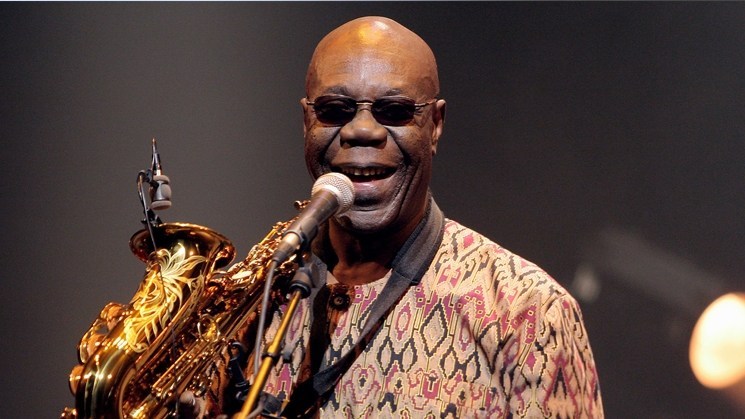Remembering Afro-jazz icon Manu Dibango
A year ago, Cameroon, Africa and the world lost a music legend – Emmanuel N’Djoke Dibango, better known as Manu Dibango.
The Afro-jazz artiste died on March 24, 2020 after contracting the coronavirus in a Paris hospital where he was being treated for another illness, his family said.
Born on December 12, 1933, Manu first came to global prominence in 1973 inspired many a younger generation of Afro-jazz musicians, including Michael Jackson.
He was celebrated for his unique tunes that blended American funk and traditional jazz with local Cameroonian rhythms to form a unique genre, with fans remembering him as a man whose hearty laughter filled his conversations.
Manu’s biggest hit, Soul Makossa, is said to have influenced Michael Jackson’s Wanna Be Starting’ Something, which was the opening track of the American’s famous 1982 album Thriller.
Manu’s song was originally written as the anthem of the 1972 African Cup of Nations football tournament that Cameroon hosted.
Manu sued the American singer for lifting a line from the song without authorisation and the two artistes settled out of court after Michael Jackson admitted his fault and requested an amicable settlement.
Manu’s love for music dates back to his teens when he attended Protestant church every night in Douala. He later moved to France where he attended high school and began learning instruments: first the piano, then saxophone – for which he became best known – and also the vibraphone.
At 86, Manu was still able to withstand a two-hour long concert and despite being a chronic smoker, he could still play the saxophone, an instrument that required ‘lung power’.
The trailblazing saxophonist, nicknamed “Papy Groove”, collaborated with many other musicians, including Fela Kuti, the Nigerian multi-instrumentalist, musician, composer and Hugh Masekela, the South African trumpeter, flugelhornist, cornetist, singer and composer.
In an autobiography, Manu said he left Africa for France, carrying three kilos of coffee for his adopted family. The book, Trois kilos de café: autobiographie (Three Kilos of Coffee: An Autobiography), chronicles his remarkable rise from his birth in Douala, Cameroon, to his worldwide success—with Soul Makossa in 1972—as the first African musician to record a top 40s hit.
On the first anniversary of Manu’s demise, local radio and television stations in Cameroon played his songs as a tribute to the iconic musician.
Manu Dibango died five days after singer and composer Aurlus Mabélé, whose family confirmed also died of the virus. His daughter and singer, Liza Monet, confirmed he died of the coronavirus in Paris on March 19, 2020, at the age of 67.
Aurlus had a fragile health condition for more than 15 years after suffering a stroke.
Aurlus Mabélé created the musical brand Soukous, a high-tempo African and Caribbean dance hall style with pop and soul blends. He also created a dancing and dressing style that accompanied the music genre, which many of his fans adopted.
Born Aurélien Miatsonama on October 24, 1953, the man who was nicknamed “King of Soukous” moved to France after rising to prominence in Brazzaville, in his native Republic of Congo in the 70s and the 80s with the group Les Ndimbola Lokole. While in France, he cofounded the group “Loketo” with the famous guitarist Diblo Dibala and became its lead singer. The group toured Africa, Europe, the Caribbean and the United States.
The Congolese legend sold more than 10 million records and had a huge following across Africa.
Culled from The East African





